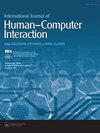人机交互过程中的情感体验研究
IF 3.4
3区 计算机科学
Q2 COMPUTER SCIENCE, CYBERNETICS
International Journal of Human-Computer Interaction
Pub Date : 2023-09-27
DOI:10.1080/10447318.2023.2259710
引用次数: 0
摘要
摘要随着人机交互(HCI)技术越来越融入我们的日常生活,除了人机交互的效率外,交互体验也越来越受到人们的关注。在本研究中,我们进行了一项调查,探讨情境特定的情感体验在HCI。400名参与者被招募来报告他们在6个代表性HCI场景中对44个细粒度情绪项目的情绪体验频率。与作为对照的6个匹配的人机交互(HHI)场景相比,HCI场景通常更频繁地与负面情绪相关,而与积极情绪相关的频率更低,特别是当计算机作为与其他人交流的工具时。将44个情绪体验项归纳为5个因素,分别为低唤醒专注、积极投入、情感共情、高唤醒消极和沮丧困惑。我们的研究全面概述了人机交互中情境特定的情感体验,并为人机交互应用中的情感评估提供了一个框架。关键词:情感语境特殊性人机交互(HCI)人机交互(HHI)调查披露声明作者未报告潜在的利益冲突。基金资助:国家自然科学基金[61977041]、清华大学春风基金[2021Z99CFY037]、清华大学教育创新基金[DX05_02]。作者简介唐璐璐,清华大学心理学系研究生。她目前的研究兴趣包括人机交互、情感测量和用户体验。袁培军是中国齐元实验室的研究科学家。毕业于中国科学院心理研究所,获认知神经科学博士学位。她目前的研究兴趣包括人机交互、认知的时空动态和视觉注意力。张丹,清华大学心理学系副教授。2011年获清华大学生物医学工程博士学位。主要研究方向为情感计算、脑机接口、情感的心理基础等。本文章由计算机程序翻译,如有差异,请以英文原文为准。
Emotional Experience during Human-Computer Interaction: A Survey
AbstractAs human-computer interaction (HCI) technology becomes more and more integrated into our daily life, increasing attention has been drawn towards the interaction experience in addition to HCI efficiency. In the present study, we conducted a survey to explore context-specific emotional experience in HCI. Four hundred participants were recruited to report the frequency of their emotional experiences on 44 fine-grained emotion items in six representative HCI scenarios. Compared with six matched human-human interaction (HHI) scenarios used as control, the HCI scenarios were in general more frequently associated with negative emotions, and less frequently associated with positive emotions, especially when computer served as a tool for communication with other people. Furthermore, the 44 emotional experience items in HCI were summarized as five factors, representing low-arousal focused, positively engaged, emotionally empathetic, high-arousal negative and frustratingly confused. Our study presents a comprehensive overview of context-specific emotional experience in human-computer interactions and provides a framework for emotion evaluation in HCI applications.Keywords: Emotioncontext specificityhuman-computer interaction (HCI)human-human interaction (HHI)survey Disclosure statementNo potential conflict of interest was reported by the author(s).Additional informationFundingThis work is supported by the National Natural Science Foundation of China [61977041], the Tsinghua University Spring Breeze Fund [2021Z99CFY037], and the Education Innovation Grants of Tsinghua University [DX05_02].Notes on contributorsLilu TangLilu Tang is a graduate student in the Department of Psychology at Tsinghua University, China. Her current research interests include human-computer interaction, emotion measurement, and user experience.Peijun YuanPeijun Yuan is a research scientist in Qiyuan Lab, China. She received her Ph.D. degree in cognitive neuroscience from the Institute of Psychology, Chinese Academy of Sciences. Her current research interests include human-computer interaction, spatiotemporal dynamics of cognition, and visual attention.Dan ZhangDan Zhang is an associate professor in the Department of Psychology at Tsinghua University, China. He received his Ph.D. degree in biomedical engineering at Tsinghua University in 2011. His research interests include affective computing, brain-computer interface, as well as the psychological basis of emotion.
求助全文
通过发布文献求助,成功后即可免费获取论文全文。
去求助
来源期刊

International Journal of Human-Computer Interaction
工程技术-计算机:控制论
CiteScore
9.00
自引率
21.30%
发文量
347
审稿时长
2 months
期刊介绍:
The International Journal of Human-Computer Interaction addresses the cognitive, creative, social, health, and ergonomic aspects of interactive computing.
It emphasizes the human element in relation to the systems and contexts in which humans perform, operate, network, and communicate, including mobile apps, social media, online communities, and digital accessibility. The journal publishes original articles including reviews and reappraisals of the literature, empirical studies, and quantitative and qualitative contributions to the theories and applications of HCI.
 求助内容:
求助内容: 应助结果提醒方式:
应助结果提醒方式:


